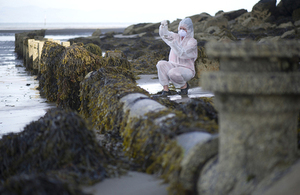MMO welcomes first NERC Knowledge Exchange Fellows
Marine Management Organisation (MMO) announces start of two Natural Environmental Research Council (NERC) Exchange Fellows

The NERC roles will encourage greater knowledge exchange around marine research
The Marine Management Organisation (MMO) has welcomed its first Natural Environmental Research Council (NERC) Fellows to support its work in improving access to marine science.
Dr Jacqui Tweddle from the University of Aberdeen and Dr Katherine Yates from the University of Salford have started in their new roles of Knowledge Exchange Fellows, helping the MMO to deliver key elements of its Evidence Strategy.
Dr Tweddle and Dr Yates’ three year fellowships will focus on the use of science in decision making and marine management, encouraging greater knowledge exchange around marine research.
The two fellowships which are funded by NERC, will:
- Support the review of the use of science in the MMO’s decision making processes
- encourage greater collaboration between the MMO and academic and research communities
- fill gaps in marine evidence by influencing and improving access to external marine research
As part of their fellowship Dr Tweddle and Dr Yates will also identify and promote the vast amounts of marine data and evidence generated by scientific researchers to the MMO enabling the MMO to provide effective, efficient, targeted marine management based on the most up to data knowledge.
This is work is an important part of delivering Part 2 of the MMO’s Evidence Strategy, published August 2016. The Strategy sets out how knowledge exchange, partnership and influencing research will be used to deliver the MMO’s future evidence requirements.
Dr Tweddle said: “I’m excited to be working with the MMO, and grateful to NERC for the opportunity. Understanding more clearly what the MMO needs, and how the research community can support that, is a priority for me. I want to help the MMO access and use the best scientific evidence and expertise available. Facilitating new contacts between researchers and the MMO will both help the MMO, but also provide researchers with opportunities to have their work make the biggest impact it can in supporting how we manage out marine activities.”
Dr Katherine Yates added: “Marine management is incredibly complicated and it’s essential that management decisions are based on robust, up-to-date evidence. Our roles will be to help with evidence provision, through both personal contributions and by facilitate partnerships between the academic community and the MMO. It’s an exciting opportunity and I am grateful to be part of it.”
Adam Cook, MMO’s Head of Evidence welcomed the two knowledge exchange fellows:
“We are delighted to welcome Jacqui and Katherine to the MMO. The scale and complexities of our seas means there is still much to learn about their ecosystems and our impact on them. Access to high quality evidence is critical to delivering effective and sustainable marine management and their work will be an invaluable part of improving access to this information.”
Notes
- Dr Jacqui Tweddle is a research fellow at the University of Aberdeen, and is an oceanographer with expertise in marine spatial planning.
- Dr Katherine Yates is a lecturer at University of Salford specialising in marine conservation planning and spatial management.
- Both fellowships are funded by the Natural Environment Research Council. NERC Knowledge Exchange Fellows focus on accelerating and amplifying impact of NERC science. They do this through a number of different mechanisms, from NERC-funded research to working with business, non-governmental organisations (NGOs) or, as in this case, government bodies.
- This new partnerships between the MMO and NERC is an important part of delivering the MMO’s Evidence Strategy, improving access to the latest scientific research and providing funding for a new Knowledge Exchange Fellowship.
- NERC is the UK’s main agency for funding and managing research, training and knowledge exchange in the environmental sciences. Their work covers the full range of atmospheric, Earth, biological, terrestrial and aquatic science, from the deep oceans to the upper atmosphere and from the poles to the equator. They co-ordinate some of the world’s most exciting research projects, tackling major issues such as climate change, environmental influences on human health, the genetic make-up of life on Earth, and much more. NERC is a non-departmental public body. They receive around £330m of annual funding from the Department for Business, Energy and Industrial Strategy (BEIS).